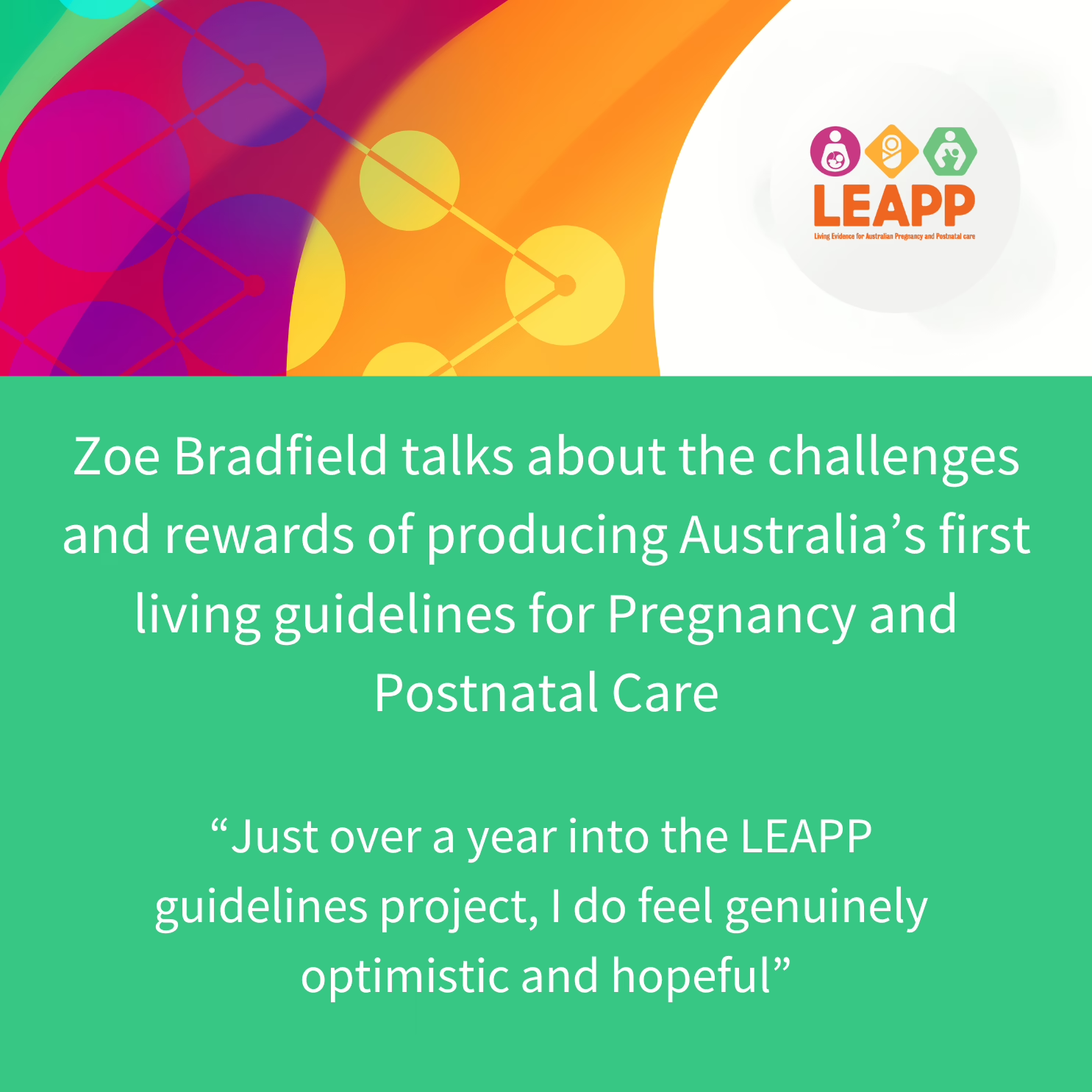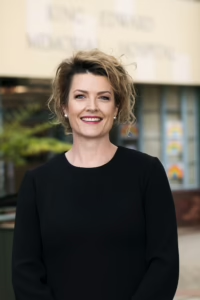
The Living Evidence for Australian Pregnancy and Postnatal Care (LEAPP) Guidelines Group is made up of Australia’s leading maternal and child health researchers, clinicians and passionate consumer advocates. Together, they draw on their deep knowledge, skills, lived experience and enthusiasm for collaboration to shape new and updated recommendations for pregnancy and postnatal care in all corners of the country.
Professor Zoe Bradfield has been Co-Chair of the LEAPP Guidelines Group since July last year, and has contributed so much of her time and amazing expertise to panel meetings and project deliberations throughout this time. Zoe is stepping down from this role next month, but will continue to represent the Australian College of Midwives on the LEAPP Steering Committee.
Here, Zoe reflects on her experience with LEAPP to date, and shares her thoughts on the scope and impact of the guidelines in the years ahead.

Photo Credit: Curtin University
Professor Zoe Bradfield wears many hats, as the growing list of her stellar contributions to the worlds of research, education, midwifery and healthcare attests. An Associate Professor of Midwifery at Curtin University and King Edward Memorial Hospital, Zoe also leads translational research focused on improving care for women at The University of Western Australia, Monash University and the Burnet Institute. She was elected President of the Australian College of Midwives (ACM) earlier this year, is an NHMRC Early Leadership Fellow and has co-chaired the LEAPP Guidelines Group since its inception in 2024.
Outside of worlds of academia and health, Zoe is also regularly called on by the ABC to shed light on diverse issues including birth trauma, COVID-19 and childbirth, medication shortages for pregnant women, continuity of care, rural Australia’s shortage of midwives, and the rapid increases in labour induction. So it’s not surprising then that Zoe was recently nominated as Western Australia’s finalist for the Young Tall Poppy science awards, which recognise intellectual and scientific excellence along with an exceptional ability to spark interest in science in the broader community.
The common thread running through all aspects of Zoe’s wide-ranging work program, is a genuine interest in and commitment to listening and responding to women and their lived experiences. She isn’t afraid to challenge long-held assumptions, practices and protocols that impact women’s care, experiences and outcomes, as she explains.
‘Holding a mirror up or asking questions of any industry – including healthcare – presents a challenge to the status quo, and that can be confronting,’ Zoe says. ‘When we consider the industrialisation of healthcare, there’s no doubt it’s delivered many positive things – like universal access for example. But there are also negative consequences of industrialising health that we need to look at and address. Healthcare designed to be accessible for as many people as possible can be delivered in this very uniform and automatic way to individuals that actually have different needs. The benchmark for contemporary healthcare is not just whether you leave with a pulse or not. In what condition do you leave? Did we do everything possible to optimise your health? I’m quite comfortable with encouraging all of us as health professionals to ask these kinds of questions and hold a mirror to ourselves, because I think we owe that to the women and the families that we’re caring for.’
‘Just over a year into the LEAPP guidelines project, I do feel genuinely optimistic and hopeful that we can ask questions and adopt new approaches to answer and address them,’ Zoe says. ‘I love the fact that we’re breaking down historically siloed approaches to developing and sharing clinical recommendations. Traditionally certain professions and disciplines have yielded and wielded a lot of power. But the interdisciplinary work of LEAPP not just encourages us, but forces us, to be mutually submissive to the grand master of evidence and the voices of women.’
‘For me, that posture of humility is critical as a researcher, as a clinician and as a leader. We need to continue to be open and to listen, and that forced mutual submission is really healthy – even if it’s quite new and challenging for all of us. To me the fact that all of our skilled and experienced panel members can come together from around the country and work on LEAPP in such a collaborative way speaks volumes about our capacity and our potential to really make change, not just in the evidence, but also affecting cultural transformation in healthcare more broadly.’
‘Looking ahead, we’ll continue to build and work the muscles of the living evidence process for pregnancy and postnatal care, and provide evidence and consensus-based recommendations on priority topics. I think the next goal will then be to get intrapartum care into the spotlight because that’s where a lot of the technical challenges of the care that we provide exist.’
‘We’ve already begun to shine this great big light on the evidence we have and – just as importantly – the evidence we don’t have, but really need. The key to LEAPP’s success is that where we do lack evidence, we’re building this consensus set of recommendations that actually prioritises the voices of those with lived experience. That’s the critical piece that’s been missing from traditional guidelines, especially when it comes to maternity care. You can see the confidence of our Consumer Panel rising. They feel confident to have a voice, and contribute in a way that’s just so meaningful and important. So to see our guideline panels and groups working with and learning from those with lived experience, it’s just such a joy to be part of.’
Photo Credit: Curtain University